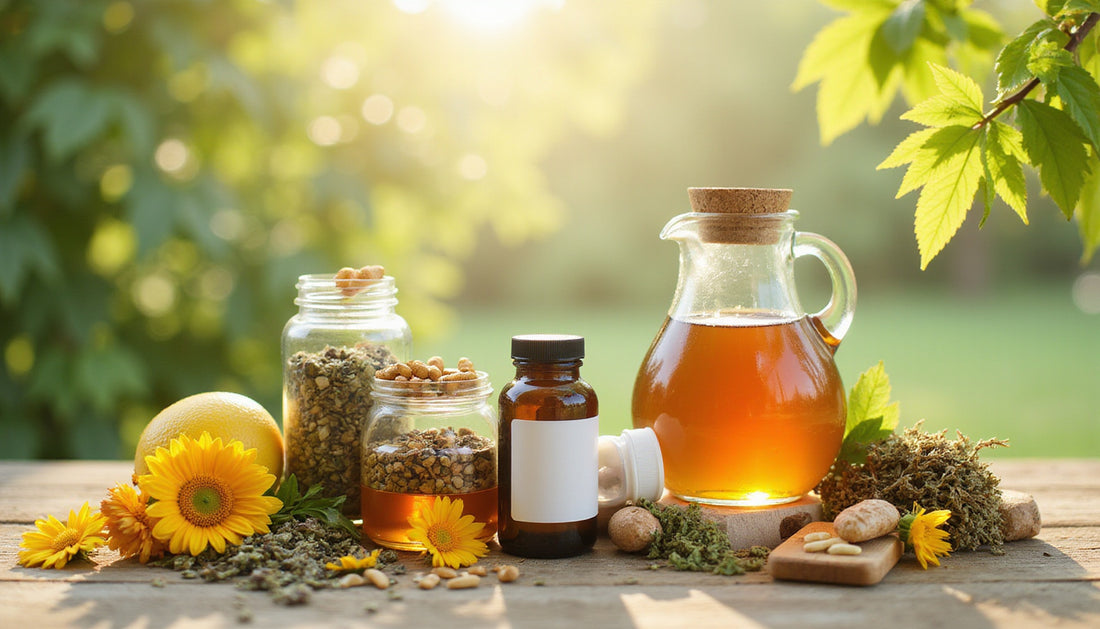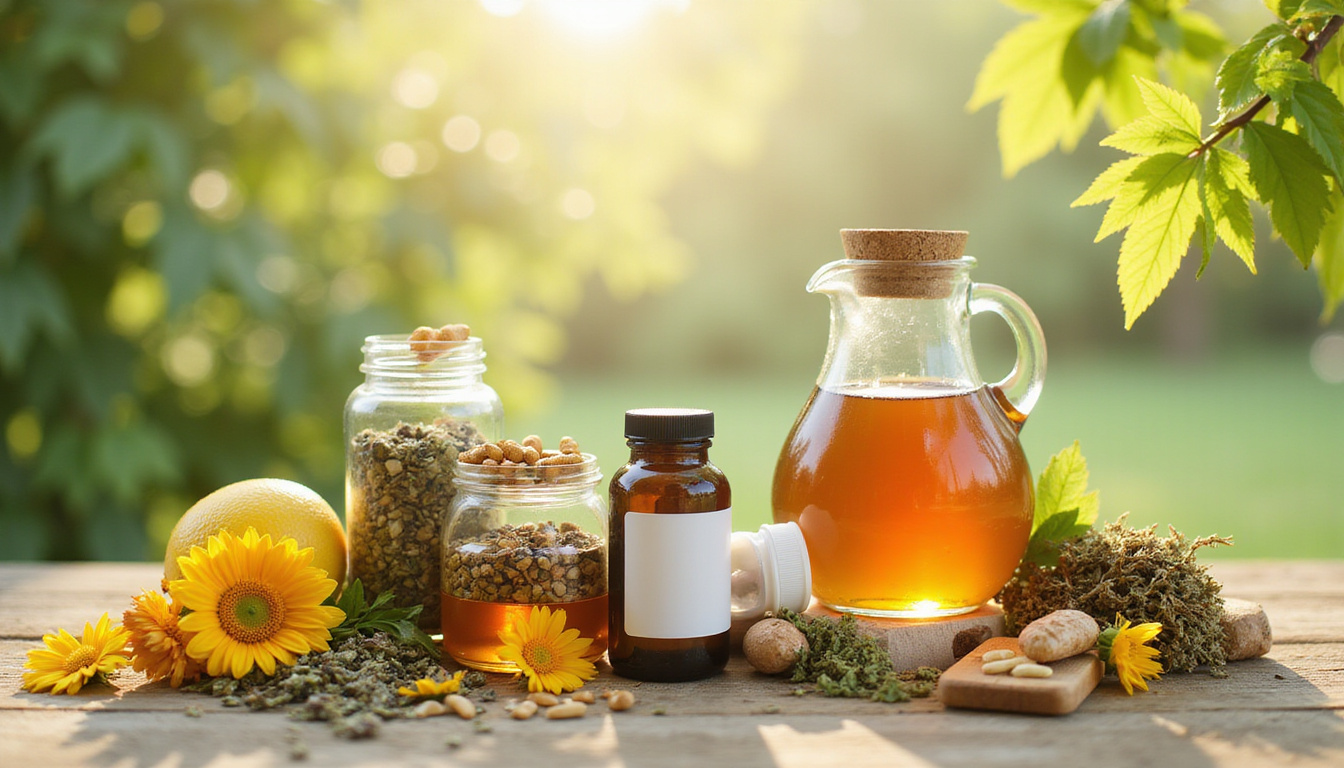
Top 5 Natural Supplements to Soothe Hay Fever Symptoms This Allergy Season
Share
Hay fever, scientifically referred to as allergic rhinitis, presents a challenging seasonal reality for many individuals, often transforming delightful summer days into uncomfortable experiences filled with sneezing, itching, and congestion. While countless individuals toss aside modern pharmaceuticals in favor of pharmaceuticals from big pharma, many are exploring holistic approaches to wellness—particularly natural supplements—that promise relief without the potential side effects. This article delves into the top five natural supplements clinically shown to ease hay fever symptoms, empowering you to make informed health choices grounded in faith and an appreciation for the body as a sacred temple.

Key Takeaways
- Natural supplements like quercetin and bromelain can help reduce hay fever symptoms by acting as anti-inflammatories and histamine blockers.
- Stinging nettle and probiotics may support immune system regulation, potentially alleviating allergic reactions during peak allergy seasons.
- Local honey is thought to help the body adapt to pollen, offering a natural approach to easing hay fever symptoms, though scientific support is limited.
Understanding Hay Fever: Symptoms and Triggers
## Understanding Hay Fever: Symptoms and Triggers
Hay fever, also known as allergic rhinitis, can turn what should be pleasant summer days into miserable experiences. With a constant runny nose, itchy eyes, and relentless sneezing, those affected often seek relief through various means. While over-the-counter medications are a go-to solution for many, an increasing number of people are turning to natural supplements as a way to alleviate their symptoms without the side effects often associated with pharmaceuticals. In this article, we explore some of the most promising natural supplements that might help ease the discomfort of hay fever.
###
1. Quercetin
Quercetin is a flavonoid naturally found in many fruits and vegetables, such as onions, apples, and berries. This supplement is well-regarded for its anti-inflammatory and antioxidant properties. Studies suggest that quercetin can help stabilize mast cells, which reduces the release of histamine—the chemical that triggers allergy symptoms. Incorporating quercetin into your daily regime before allergy season can potentially help manage the severity of hay fever symptoms.
###
2. Bromelain
Bromelain is an enzyme found in pineapple juice and in the pineapple stem. It's often used to treat swelling and inflammation, particularly of the sinuses after surgery or injury. For those with hay fever, [bromelain can help improve breathing by reducing nasal swelling](https://www.justvitamins.co.uk/Glucosamine/High-Strength-Bromelain-Supplement.aspx) and thinning mucus. When combined with quercetin, the effectiveness of both supplements may be enhanced, providing better relief from nasal congestion and other irritating symptoms.
###
3. Stinging Nettle
Stinging nettle has been used as a herbal remedy for centuries, traditionally utilized to treat joint pain and help rid the body of excess water. For allergy sufferers, stinging nettle may be beneficial due to its ability to act as a natural antihistamine. By blocking the body’s ability to produce histamine, it can help ease the symptoms of hay fever. It is usually taken in capsule or tea form and is most effective when consumed regularly before the onset of the allergy season.
###
4. Probiotics
Probiotics are live bacteria and yeasts that are beneficial for your digestive system. Emerging research suggests that they may also play a role in supporting the immune system and potentially reducing allergic reactions. By enhancing gut health, [probiotics may help regulate the body’s immune response to allergens](https://www.justvitamins.co.uk/Probiotics/Acidophilus-Plus-5-billion-with-Prebiotic.aspx), potentially reducing the intensity of hay fever symptoms.
###
5. Local Honey
Consuming local honey is often suggested as a natural remedy for hay fever because it contains pollen from local plants, which might help your body adapt to and decrease its sensitivity to the local pollen. The theory is akin to a natural form of immunotherapy. While scientific evidence supporting this is limited, some people report a reduction in their symptoms after incorporating local honey into their diet.
### Conclusion
When considering natural supplements for hay fever, it’s important to consult with a healthcare provider, especially if you’re pregnant, nursing, or on medication that might interact with herbal remedies. Natural doesn't always mean safe for everyone; however, for many, these supplements can provide a much-needed respite from the discomfort of hay fever without the reliance on traditional medications.
As with any health condition, the key to managing hay fever effectively is understanding your triggers, taking preventative measures before the season starts, and finding a treatment plan that works best for you. Whether through natural supplements, lifestyle adjustments, or traditional medications, relief from hay fever is achievable.
The Role of Natural Supplements in Managing Hay Fever
The Role of Natural Supplements in Managing Hay Fever
Hay fever, also known as allergic rhinitis, can turn what should be pleasant summer days into miserable experiences. With a constant runny nose, itchy eyes, and relentless sneezing, those affected often seek relief through various means. While over-the-counter medications are a go-to solution for many, an increasing number of people are turning to natural supplements as a way to alleviate their symptoms without the side effects often associated with pharmaceuticals. In this article, we explore some of the most promising natural supplements that might help ease the discomfort of hay fever.
1. Quercetin
Quercetin is a flavonoid naturally found in many fruits and vegetables, such as onions, apples, and berries. This supplement is well-regarded for its anti-inflammatory and antioxidant properties. Studies suggest that quercetin can help stabilise mast cells, which reduces the release of histamine – the chemical that triggers allergy symptoms. Incorporating quercetin into your daily regime before allergy season can potentially help in managing the severity of hay fever symptoms.
2. Bromelain
Bromelain is an enzyme found in pineapple juice and in the pineapple stem. It's often used to treat swelling and inflammation, particularly of the sinuses after surgery or injury. For those with hay fever, bromelain can help improve breathing by reducing nasal swelling and thinning mucus. When combined with quercetin, the effectiveness of both supplements may be enhanced, providing better relief from nasal congestion and other irritating symptoms.
3. Stinging Nettle
Stinging nettle has been used as a herbal remedy for centuries, traditionally utilized to treat joint pain and help rid the body of excess water. For allergy sufferers, stinging nettle may be beneficial due to its ability to act as a natural antihistamine. By blocking the body’s ability to produce histamine, it can help ease the symptoms of hay fever. It is usually taken in capsule or tea form and is most effective when consumed regularly before the onset of the allergy season.
4. Probiotics
Probiotics are live bacteria and yeasts that are beneficial for your digestive system. Emerging research suggests that they may also play a role in supporting the immune system and potentially reducing allergic reactions. By enhancing gut health, probiotics may help regulate the body’s immune response to allergens, potentially reducing the intensity of hay fever symptoms.
5. Local Honey
Consuming local honey is often suggested as a natural remedy for hay fever because it contains pollen from local plants, which might help your body adapt to and decrease its sensitivity to the local pollen. The theory is akin to a natural form of immunotherapy. While scientific evidence supporting this is limited, some people report a reduction in their symptoms after incorporating local honey into their diet.
Conclusion
When considering natural supplements for hay fever, it’s important to consult with a healthcare provider, especially if you’re pregnant, nursing, or on medication that might interact with herbal remedies. Natural doesn't always mean safe for everyone; however, for many, these supplements can provide a much-needed respite from the discomfort of hay fever without the reliance on traditional medications.
As with any health condition, the key to managing hay fever effectively is understanding your triggers, taking preventative measures before the season starts, and finding a treatment plan that works best for you. Whether through natural supplements, lifestyle adjustments, or traditional medications, relief from hay fever is achievable.
[PRODUCT-EMBED-177][PRODUCT-EMBED-132]
